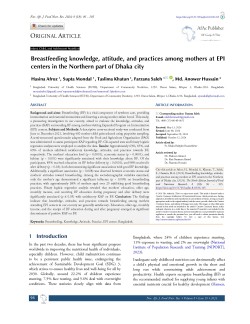Main Article Content
Breastfeeding knowledge, attitude, and practices among mothers at EPI centers in the Northern part of Dhaka city
Abstract
Background and aims: Breastfeeding (BF) is a vital component of newborn care, providing immunization and essential immunities and fostering a strong mother-infant bond. This study, a pioneering investigation in our country, aimed to evaluate the knowledge, attitudes, and practices (KAP) surrounding BF among mothers visiting Expanded Program on Immunization (EPI) centers. Subjects and Methods: A descriptive cross-sectional study was conducted from June to December 2021, involving 400 mother-child pairs selected using purposive sampling. A semi-structured questionnaire adapted from the Food and Agriculture Organization (FAO) was administered to assess participant KAP regarding BF. Chi-squared tests and binary logistic regression analyses were employed to analyze the data. Results: Approximately 63%, 65%, and 69% of mothers exhibited satisfactory knowledge, attitudes, and practices towards BF, respectively. The mothers' education level (p = 0.0001), economic status (p = 0.0001), and habitat (p = 0.001) were significantly associated with their knowledge about BF. Of the participants, 85% received education on BF before delivery (p = 0.0001), and 98% received it after delivery (p = 0.03), both demonstrating significant associations with good BF knowledge. Additionally, a significant association (p = 0.008) was observed between economic status and mothers' attitudes toward breastfeeding. Among the sociodemographic variables examined, only the mother's age demonstrated a significant influence (p = 0.009) on breastfeeding practices, with approximately 38% of mothers aged over 25 exhibiting good breastfeeding practices. Binary logistic regression analysis revealed that mothers’ education, older age, monthly income, and receiving BF education during pregnancy and after delivery were significantly associated (p ≤ 0.05) with satisfactory KAP on BF. Conclusion: The findings indicate that knowledge, attitudes, and practices towards breastfeeding among mothers attending EPI centers in our country are generally satisfactory. Education, older age, monthly income, and the receipt of BF education during and after pregnancy emerged as significant determinants of positive KAP on BF.







